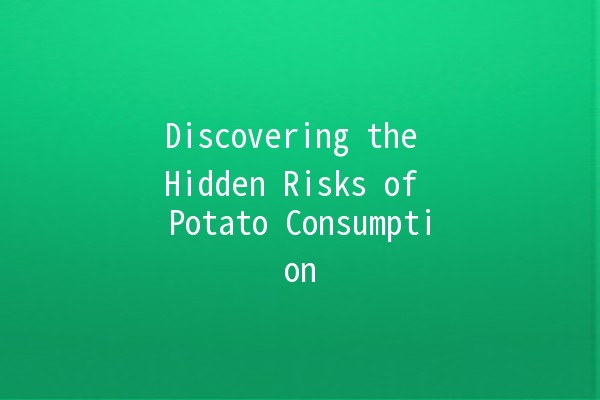: Understanding the Safety Concerns of Potatoes
Potatoes are a staple food enjoyed worldwide, celebrated for their versatility and satisfying taste. While they may seem harmless, there are several safety concerns associated with their consumption. This article aims to delve into the potential hazards that can arise from potatoes, particularly when it comes to preparation, storage, and ingestion. We will provide practical advice and productivityenhancing tips to help you enjoy potatoes safely and healthily.
Safety Concerns Associated with Potatoes
One of the primary safety concerns regarding potatoes is the presence of alkaloids, specifically solanine and chaconine. These natural toxins are produced by the plant as a defense mechanism against pests and diseases. When potatoes are exposed to light or stored improperly, their alkaloid levels can increase significantly.
Tip: Always store potatoes in a cool, dark place to minimize alkaloid production. If a potato has green patches or sprouts, cut these parts away before cooking, as they often contain higher concentrations of toxins.
Example Application:

For instance, if you find a bag of potatoes in your pantry, take a moment to check for any green spots or sprouts. If you discover them, peel the potatoes thoroughly or discard the affected ones to ensure safe consumption.
Consuming raw potatoes can lead to digestive discomfort. Raw potatoes contain resistant starch and can be difficult for the body to digest, leading to bloating or gas. Cooking potatoes properly significantly reduces these concerns.
Tip: Always cook potatoes until they are soft and tender to improve digestibility. Boiling, baking, or roasting are effective cooking methods.
Example Application:
Instead of snacking on raw potato slices, consider making baked potato wedges or mashed potatoes. This not only enhances the flavor but also ensures that you are consuming them safely.
Like other vegetables, potatoes can harbor harmful bacteria if not prepared correctly. Crosscontamination from utensils, cutting boards, or unwashed produce can lead to foodborne illnesses.
Tip: Use separate cutting boards for raw meats and vegetables to prevent crosscontamination. Always wash potatoes under running water before cooking to remove any dirt or bacteria.
Example Application:
When preparing a meal that includes potatoes and meat, use a dedicated cutting board for the meat. After preparing the meat, thoroughly wash the cutting board and knife before slicing the potatoes to minimize any health risks.
While rare, some individuals may have an allergy or sensitivity to certain proteins found in potatoes. Symptoms can range from mild gastrointestinal discomfort to more severe allergic reactions.
Tip: If you experience adverse reactions after eating potatoes, consider consulting a healthcare professional to identify any potential allergies or sensitivities.
Example Application:
If you suspect you have a potato allergy, keep track of your symptoms in relation to your diet. This record can help your healthcare provider tailor an appropriate test or treatment for your condition.
Productivity Tips for Safe Potato Consumption
Planning your meals ahead of time can help minimize food waste and ensure safe consumption of your potatoes. Prepare and cook potatoes in batches to use throughout the week.
Practical Application:
Wash, peel, and prepare your potatoes, then cook them as desired (boiling, baking, etc.). Store them in airtight containers in the fridge. This way, you can easily incorporate them into meals, reducing preparation time during busy weekdays.
Don’t throw away potato peels! Instead, use them to make potato chips or add them to broths for extra flavor. This not only promotes sustainability but also enhances your meals.
Practical Application:
After peeling potatoes for a meal, toss the skins with a bit of oil and seasoning, and bake them until crispy. This creates a healthy snack while reducing waste.
Potatoes are excellent sources of carbohydrates and can be part of a balanced meal. Combine them with protein sources and fresh vegetables to maintain nutritional diversity.
Practical Application:
Create a wellrounded plate with baked potatoes served alongside grilled chicken and steamed broccoli. This balances the meal nutritionally while providing a hearty and satisfying dish.
Different potato varieties not only have various tastes but also different nutritional profiles. Experimenting with these can add diversity to your diet while also addressing potential safety concerns.
Practical Application:
Try sweet potatoes instead of standard white potatoes for a different flavor and higher nutritional content. Swap recipes to explore the varying cooking times and methods for different types of potatoes.
Maintaining a log of how you use potatoes can help track their freshness and ensure a safe consumption timeline. This is a simple yet effective productivity tool.
Practical Application:
Create a simple spreadsheet or use a notetaking app to log the purchase date and usage of each bag of potatoes. This habit prevents spoilage and encourages proper storage methods.
Common Questions About Potato Safety
Solanine poisoning can cause nausea, vomiting, diarrhea, and, in severe cases, neurological symptoms like hallucinations or paralysis. If you suspect solanine poisoning, seek medical attention immediately.
Cooking potatoes significantly reduces solanine levels, especially when they are green or sprouted. However, it's best to avoid consuming these altogether to ensure safety.
While most potato varieties are safe, stay cautious with green or sprouting potatoes, as well as those with a bitter taste, indicating higher alkaloid levels.
Potatoes can be stored for several weeks or months, depending on conditions. Ensure they are kept in a cool, dark, and dry place to prolong their shelf life.
Potato peels are generally safe to eat, but ensure they are washed thoroughly to remove pesticides or dirt. Organic potatoes are the best choice for consumption of the skin.
Yes! Cooked potatoes can be refrigerated for up to 3–5 days. Ensure you store them in an airtight container and reheat them thoroughly before consuming.
al Thoughts
By being aware of the potential risks associated with potato consumption and implementing the practical tips provided, you can enjoy this versatile food while minimizing health concerns. Embrace the joy of cooking, and explore various methods to incorporate potatoes into your meals safely. Remember, a little caution goes a long way in ensuring a delicious and safe dining experience.